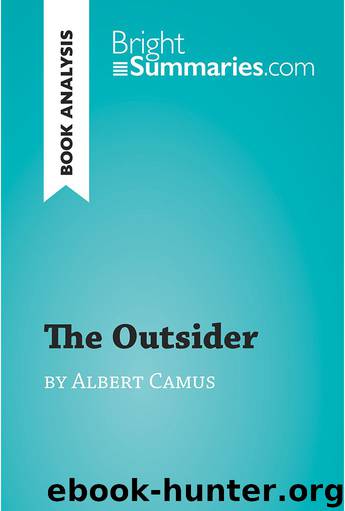The Outsider by Albert Camus (Book Analysis) by BrightSummaries.com

Author:BrightSummaries.com
Language: eng
Format: epub
Publisher: BrightSummaries.com
Published: 2018-02-15T08:29:15+00:00
ANALYSIS
THE ROLE OF THE ABSURD
The Outsider is part of Camus’s so-called “Cycle of the Absurd”, along with the essay The Myth of Sisyphus and the play Caligula. He uses this novel to reflect on the Absurd, a theme that is at the heart of his philosophy and his writing. For Camus, the Absurd is first and foremost a feeling that anyone can experience, and which comes from the realisation that the world is impassive and utterly indifferent to human problems. No matter what questions we ask, actions we take or decisions we make, the world around us will never react or respond.
Meursault embodies this feeling of absurdity, as nothing seems to have importance or meaning for him apart from his sensual experiences. He is almost indifferent to his own existence, a stranger to himself, and follows a logic that is difficult to grasp. Moreover, in the same way that he is difficult to fully understand, the novel itself resists easy interpretation. While the theme of the Absurd is clearly central, the novel’s fundamental meaning is impossible to pin down and the story is itself absurd. It is perhaps this complexity that makes The Outsider such an original and widely studied work, despite the sometimes-fierce criticism it has attracted. Since its release in 1942, it has been universally acknowledged as an important work of fiction and a reflection of one of the key preoccupations of its time, namely mistrust for language and for meaning in general. These elements can be found in particular in the existentialist movement in philosophy, and in the Nouveau Roman in literature.
Camus and existentialism
The philosophical movement of existentialism emerged in the wake of turmoil that characterised the early 20 th century. It focuses on the human experience of existence and argues that humans are the only beings who are completely free to forge their own nature through their choices, as they are the only truly self-aware species. However, this limitless choice engenders a sense of angst with regard to the meaning of life, which is why the issue of meaning is central to existentialist works.
Although Camus was initially associated with the existentialists, particular Jean-Paul Sartre (1905-1980), because he shared their feeling of angst and search for meaning in an ultimately indifferent world, he later moved away from them and took a more positive approach to the same issues. His works depict an absurd world, but they are nonetheless characterised by a sense of hope and espouse the belief that beauty, peace and justice can confer meaning on life.
Download
This site does not store any files on its server. We only index and link to content provided by other sites. Please contact the content providers to delete copyright contents if any and email us, we'll remove relevant links or contents immediately.
| ASVAB | GED |
| GRE | NCLEX |
| PRAXIS | SAT |
| See more | Flash Cards |
| Study Guides | Study Skills |
| Workbooks |
Talking to Strangers by Malcolm Gladwell(13347)
The Compound Effect by Darren Hardy(8944)
Tools of Titans by Timothy Ferriss(8365)
Wonder by R. J. Palacio(8097)
The Lover by Duras Marguerite(7893)
A Court of Wings and Ruin by Sarah J. Maas(7820)
The Circle by Dave Eggers(7104)
Deep Work by Cal Newport(7064)
Kaplan MCAT General Chemistry Review by Kaplan(6926)
To All the Boys I've Loved Before by Jenny Han(5841)
Wiseguy by Nicholas Pileggi(5770)
The Body: A Guide for Occupants by Bill Bryson(5080)
Eat That Frog! by Brian Tracy(4526)
1,001 ASVAB Practice Questions For Dummies by Powers Rod(4500)
Cracking the GRE Premium Edition with 6 Practice Tests, 2015 (Graduate School Test Preparation) by Princeton Review(4280)
Pre-Suasion: A Revolutionary Way to Influence and Persuade by Robert Cialdini(4224)
Barron's AP Biology by Goldberg M.S. Deborah T(4146)
ACT Math For Dummies by Zegarelli Mark(4043)
Alive: The Story of the Andes Survivors by Piers Paul Read(4018)
